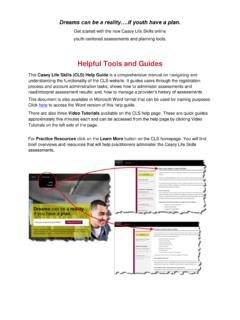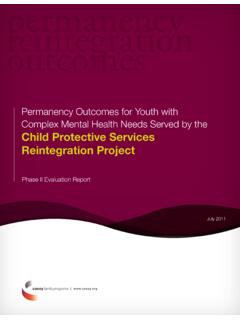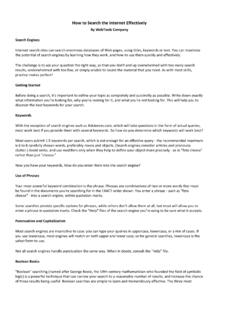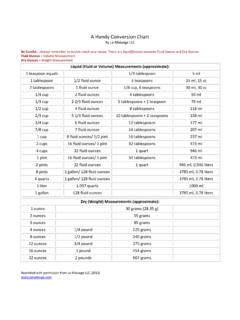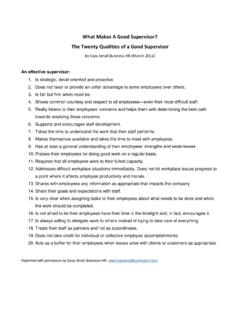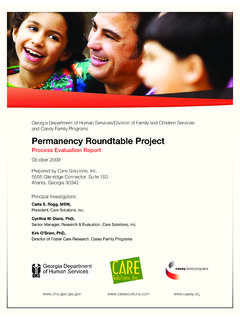Transcription of EDUCATION JOB SEEKING SKILLS AND JOB MAINTENANCE …
1 Independent Living SKILLS Module III. Preparing Adolescents for Young Adulthood (PAYA). Module III. EDUCATION . JOB SEEKING SKILLS . AND. JOB MAINTENANCE . SKILLS . Handbook for Skill Development Massachusetts Department of Social Services 1. Independent Living SKILLS Module III. PAYA. MODULE III. Introduction W elcome! The topic areas you'll be working on in this booklet include such vital independent living SKILLS as EDUCATION , job SEEKING SKILLS , and job MAINTENANCE SKILLS . Each topic area includes sections for easy use: 1). assessment ; 2) Skill Plan; and 3) Activity/Resource Workbook. The assessment will help you determine your skill level in each topic area and target those SKILLS in need of further development. The Skill Plan will help you organize your efforts as you work towards each goal. The Activity/Resource Workbook contains information and exercises for each of the topic areas to help you develop or strengthen your independent living SKILLS . As you move from one skill topic to the next, you will be increasing your understanding of the fundamentals of independent living and enhancing your abilities to make a successful and smooth transition to self sufficient young adulthood.
2 Remember, it's your future! Good luck and enjoy yourself! 2. Independent Living SKILLS Module III. INDEX. EDUCATION .. 1. Job SEEKING 32. Job MAINTENANCE 110. 3. Independent Living SKILLS Module III. EDUCATION . SKILL assessment . The following questions will help you identify EDUCATION SKILLS in which you excel and target those which you need to develop. By yourself or with your team try to answer each of the questions as honestly as possible. After completing this independent living SKILLS assessment , review it with your team and identify those SKILLS you would like to strengthen. I do not I need to I can do/. know how know more have done to do this about this this 1. Am aware of the benefits of a good EDUCATION 2. Am attending school, GED classes, or a vocational training program. 3. Know how to handle problems that come up in my school or training program. 4. Know how and where to find out about what jobs and occupations I might like. 5. Know what job or career I migh want to pursue after graduation.
3 6. Know what EDUCATION or vocational training I'll need for the job/career I want. 7. Know whom I can talk to regarding my plans for further EDUCATION or training in preparation for a job. 8. Am aware of the requirements for acceptance into higher EDUCATION or training programs. 9. Am able to complete application forms for educational or training programs. 10. Am aware of the scholarships and loans available for further EDUCATION and training. 1. Independent Living SKILLS Module III. I do not I need to I can do/. know how know more have done to do this about this this 11. Know where and how to apply for financial assistance. 12. Know about the job training and educational programs that are offered in my community and surrounding cities. 13. Am able to develop a comprehensive EDUCATION /career plan. 2. Independent Living SKILLS Module III. 3. Independent Living SKILLS Module III. 4. Independent Living SKILLS Module III. LEARNING STYLES. Each of us has different learning styles.
4 While some of us learn best in groups, others learn best alone. Some people learn by listening to information; others learn better through hands on . activities. The following exercise will be helpful to you in identifying your personal learning style. How Do I Learn? CIRCLE ONE OF EACH PAIR. By myself With others From peers From adults By thinking By doing By practicing By memorizing By doing things once By doing things several times Quietly Listening to music Doing many different things Doing one thing only Through constructive criticism Through rewards To please others To please myself I Learn Best: (Summarize your answers from above.). Now that you have identified your personal learning style, you will be able to acquire and practice new SKILLS in the way that is most effective for you. 5. Independent Living SKILLS Module III. STAYING IN SCHOOL. As a child growing up in my particular surroundings, I needed a place to focus my aggression. There was indeed such a place called school.
5 I harnessed my energy from my aggression and placed it into my studies. As days were becoming harder in my life, I focused on my studies. I. came to realize the numerous possibilities that an EDUCATION can hold over one's life. In today's society one must have an EDUCATION as well as dreams in order to suceed in life. Steve, 18. Why do you think getting an EDUCATION is important? When I was 16, I dropped out of high school because I thought it was just too hard and I. wanted to hang out. When I was 17, I realized that I needed an EDUCATION if I wanted to make anything out of my life. I went back and got my GED. I am now in my second year of college and plan to get my Bachelor's Degree. Christine, 18. 6. Independent Living SKILLS Module III. Discussion Activities Your best friend wants to drop out of high school. He/she states that he/she is just tired of school and does not get along with the math teacher. He/she wants to work full time in a fast food restaurant and save money to buy a car.
6 What kind of advice would you give him/her and why? James has had a hard time in school lately. He has been tardy a lot and has been failing Math and English. James feels that he wants to quit school because he will not pass the year anyway. What other possibilities does James have to resolve his problem? Tinisha was placed in a new foster home and had to go to a new school. She misses her old friends and feels isolated. She doesn't like the other students and would like to quit school. What advice would you give Tinisha? 7. Independent Living SKILLS Module III. Mike receives special EDUCATION services in English and history. Because of his special ed status, Mike thinks he will not be able to continue his EDUCATION beyond high school; therefore, he wants to quit school. Is Mike right? What do you think? Amy is attending high school and is in the 11th grade. Her best friend is thinking about quitting school. Amy does not want to be in school without her best friend and is now thinking about dropping out as well.
7 What advice would you give Amy? Robert and Zack recently met after not having seen each other for a year. They had gone to school together until Robert dropped out in the eleventh grade. Robert works at a local grocery store as a stock person and recently bought a car. He tells Zack that his decision to drop out was right because he can now afford to drive a car and has lots of spending money for the weekends. Zack responds that he is planning to go to a vocational training school after graduating from high school. Zack states that even though right now he has less money than Robert, four years from now he will earn a lot more and will be able to afford a better lifestyle and car. Robert replies that what really counts is the present and that four years from now is a long time. Who do you think is right? Why? 8. Independent Living SKILLS Module III. Questions for Discussion Do you think that most adults who dropped out of school as teens regret their decision?
8 Do you think that dropping out provides people with better opportunities for life in the long run? What kind of obstacles could get in the way of your completing your EDUCATION ? Describe. What kind of strategies and supports can you think of to help you stay in school and complete your EDUCATION ? Describe. Whom could you talk to if you need help staying in school and finishing your EDUCATION ? 1. 2. 3. 4. 9. Independent Living SKILLS Module III. What are your reasons for staying in school and completing your EDUCATION ? List Your Reasons Here : 10. Independent Living SKILLS Module III. HIGHER EDUCATION . Some teens may want to continue their EDUCATION after receiving a high school diploma or GED. certificate. Some jobs/careers require an advanced degree or certification. In order for you to successfully plan for your future, you will have to research your interests as well as your educational options. In the following section, you will have the opportunity to complete a basic career interest assessment .
9 In addition, you will receive selected information about related educational programs. However, it will be helpful to you to research other options by utilizing the activities suggested in this module. CAREER INTEREST assessment . 11. Independent Living SKILLS Module III. 12. Independent Living SKILLS Module III. 13. Independent Living SKILLS Module III. 14. Independent Living SKILLS Module III. 15. Independent Living SKILLS Module III. 16. Independent Living SKILLS Module III. 17. Independent Living SKILLS Module III. 18. Independent Living SKILLS Module III. 19. Independent Living SKILLS Module III. VOCATIONAL TRAINING/CERTIFICATION PROGRAMS. Vocational training and certification programs offer a wide variety of courses in many careers. The entry requirements differ greatly. Some programs require a GED or high school diploma for acceptance into the course. Others offer a combination of GED classes and vocational training. Some programs are free of charge; others require tuition payments.
10 A selected few might pay you a stipend. Training/certification programs also vary in duration. Most Nurse's Aide programs, for example, last for about six weeks, while computer training programs average six months. Some programs are held during the day and are full time. Others are offered through night classes and allow part-time attendance. To get more specific information about certification and training programs available in your area, contact your local Office of Employment and Training. ACTIVITY. Contact your local office of Employment and Training to get more specific information about certification and training programs. 20. Independent Living SKILLS Module III. COLLEGES & UNIVERSITIES. TWO-YEAR COLLEGES. Private and community colleges offer many certification and Associate's Degree programs. To get accepted into a two-year college, applicants must have either a high school diploma or GED. Some two-year colleges require that applicants submit SAT scores.


